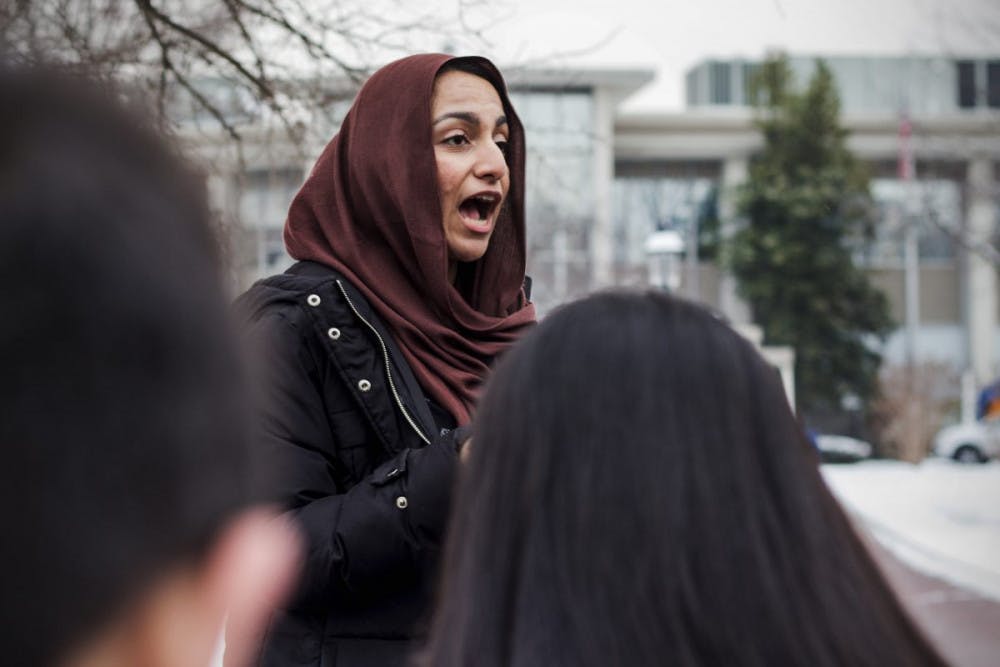The First Amendment of the United States Constitution guarantees “the right of the people peaceably to assemble, and to petition the Government for a redress of grievances.”
In today’s political climate, protests have become a staple in American life and culture.
[caption id="attachment_17362" align="aligncenter" width="838"] Community protests immigration ban. Greg Medina/Assistant Photography Editor[/caption]
The shooting of Trayvon Martin on Feb. 26, 2012 led to the creation of the Black Lives Matter movement. On Jan. 21, 2017, women all over the world joined together to support women’s rights, LGBTQ citizens and other minorities. Soon after, there was a March for Life protesting abortion. Scientists from all over the country are planning a march on Washington to protest what they feel is President Donald Trump’s lack of regard for science, specifically, climate change.
Most recently, protests broke out at airports across the country in response to Trump’s executive order temporarily barring immigrants and refugees from Syria, Iran, Libya, Iraq, Sudan, Somalia and Yemen entry to the United States.
Protesting is becoming more commonplace everywhere it seems, except for the places that used to be synonymous with demonstrations – college campuses. During the 1960s and 1970s, college students – including those at Seton Hall – demonstrated against the military draft and U.S. involvement in Vietnam. Students camped out with signs and chanted songs disproving of presidents Richard Nixon and Ronald Reagan.
But lately, raising your voice outside of class has been somewhat replaced by sharing things on Facebook, tweeting, or writing opinion pieces for The Odyssey.
After the election of Trump, college campuses all over the country, such as Yale and UCLA, did briefly erupt with angry students.
The day after the presidential election, Seton Hall students from all backgrounds stood around the seal and held a prayerful protest.
On Jan. 31, 2017, SHU’s Muslim Student Association organized a vigil to protest Trump’s immigration ban.
Despite the surge of protests on college campuses caused by the current political climate, the strength of protests and big demonstrations seems to have passed from campus out to the street, where the voices of millennials mix with broader society.
And that’s okay. In 1787, when the U.S. Constitution was signed, social media was not something the Founding Fathers took into consideration. Today, there are many ways to assemble peacefully than ever before.
Some people decide to go the old-fashioned route. They make a sign, put on some work boots and chant. Some people prefer to pass along articles and share their own words online.
Both are equally valid.
What is important is that people are making their voices heard. Regardless of beliefs, we are all Americans. By raising our voices, we are taking part in something larger than ourselves.
By protesting, we are upholding our constitutional right, as stated in the preamble to the Constitution, “to form a more perfect union.”
Isabel Soisson is a journalism major from Philadelphia, Penn. She can be reached at isabel.soisson@student.shu.edu.
Community protests immigration ban. Greg Medina/Assistant Photography Editor[/caption]
The shooting of Trayvon Martin on Feb. 26, 2012 led to the creation of the Black Lives Matter movement. On Jan. 21, 2017, women all over the world joined together to support women’s rights, LGBTQ citizens and other minorities. Soon after, there was a March for Life protesting abortion. Scientists from all over the country are planning a march on Washington to protest what they feel is President Donald Trump’s lack of regard for science, specifically, climate change.
Most recently, protests broke out at airports across the country in response to Trump’s executive order temporarily barring immigrants and refugees from Syria, Iran, Libya, Iraq, Sudan, Somalia and Yemen entry to the United States.
Protesting is becoming more commonplace everywhere it seems, except for the places that used to be synonymous with demonstrations – college campuses. During the 1960s and 1970s, college students – including those at Seton Hall – demonstrated against the military draft and U.S. involvement in Vietnam. Students camped out with signs and chanted songs disproving of presidents Richard Nixon and Ronald Reagan.
But lately, raising your voice outside of class has been somewhat replaced by sharing things on Facebook, tweeting, or writing opinion pieces for The Odyssey.
After the election of Trump, college campuses all over the country, such as Yale and UCLA, did briefly erupt with angry students.
The day after the presidential election, Seton Hall students from all backgrounds stood around the seal and held a prayerful protest.
On Jan. 31, 2017, SHU’s Muslim Student Association organized a vigil to protest Trump’s immigration ban.
Despite the surge of protests on college campuses caused by the current political climate, the strength of protests and big demonstrations seems to have passed from campus out to the street, where the voices of millennials mix with broader society.
And that’s okay. In 1787, when the U.S. Constitution was signed, social media was not something the Founding Fathers took into consideration. Today, there are many ways to assemble peacefully than ever before.
Some people decide to go the old-fashioned route. They make a sign, put on some work boots and chant. Some people prefer to pass along articles and share their own words online.
Both are equally valid.
What is important is that people are making their voices heard. Regardless of beliefs, we are all Americans. By raising our voices, we are taking part in something larger than ourselves.
By protesting, we are upholding our constitutional right, as stated in the preamble to the Constitution, “to form a more perfect union.”
Isabel Soisson is a journalism major from Philadelphia, Penn. She can be reached at isabel.soisson@student.shu.edu.





